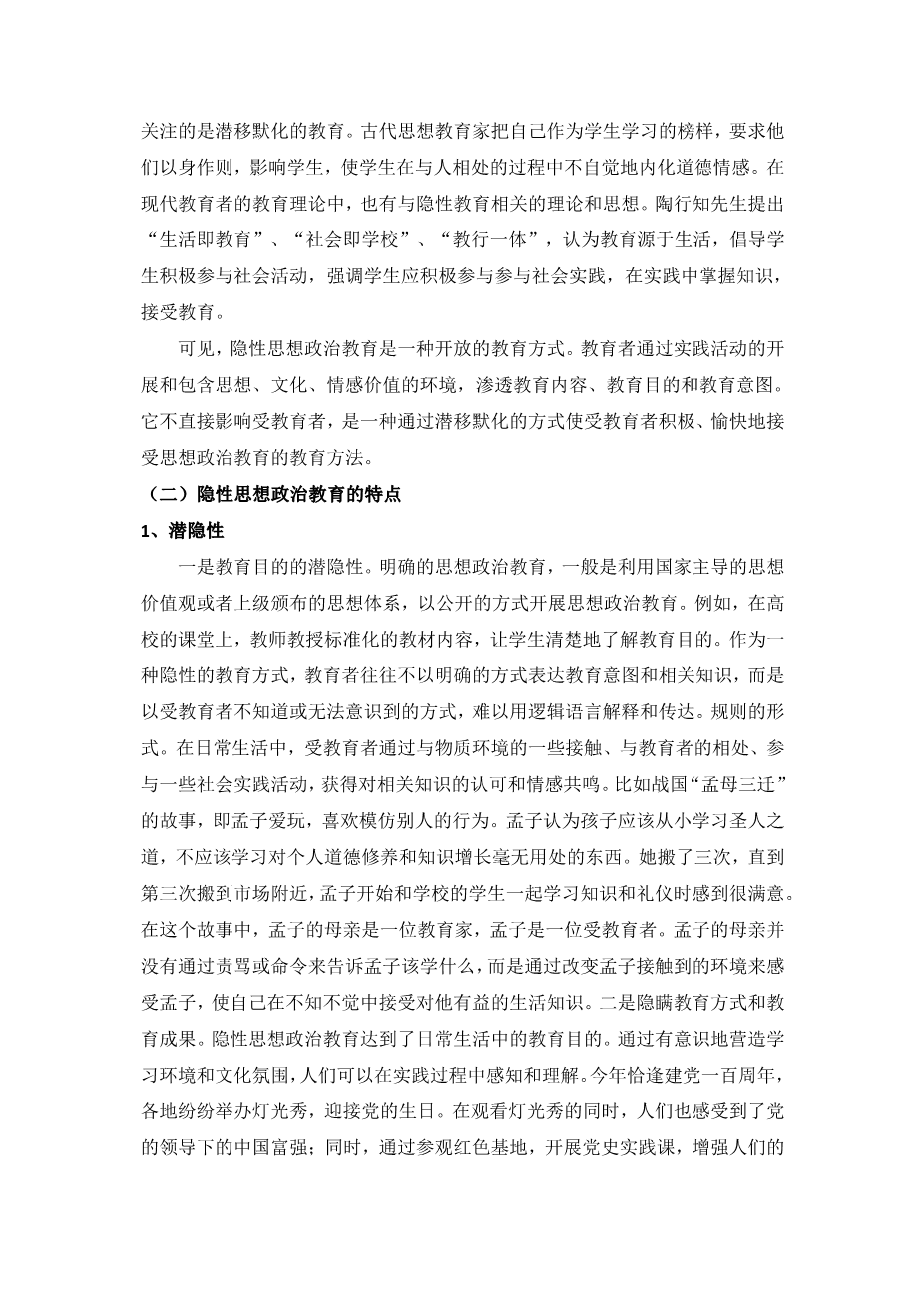高校隐性思想政治教育的价值导向与实现外文翻译资料
2023-05-14 19:37:35
Value Guidance and Realization of Implicit Ideological and Political Education in Colleges and Universities
Abstract:Ideological and political education is a lasting and necessary practical activity in human society. From the practical mode of Ideological and political education, educational activities can be divided into explicit and implicit modes. For many years, most of Chinas ideological and political education has adopted explicit ideological and political education. However, in the era of economic globalization and cultural diversity, The educatees ideas have also changed, which requires the continuous innovation of Ideological and political education methods, and the implicit ideological and political education has broken through some limitations of explicit ideological and political education. With the gradual development in teaching practice, it has shown its advantages in Ideological and political education activities because of its concealment, universality, and permeability. Because of the important role of implicit ideological and political education, colleges and universities should absorb the advanced experience and strengthen implicit ideological and political education through the construction of campus environment and the introduction of teachers.
Keywords:Colleges and universities; College student; Implicit; Ideological and Political Education.
-
Connotation and Characteristics of Implicit Ideological and Political Education
- Connotation of Implicit Ideological and Political Education
Implicit ideological and political education is relative to explicit ideological and political education. Explicit ideological and political education is the main way of Ideological and political education in Colleges and universities in China. This method originated in primitive society, experienced slave society and feudal society, and has been used until now. Explicit ideological and political education is to institutionalize ideological theory, mainly employing theoretical 'indoctrination' to educate peoples moral feelings. The difference between implicit education and explicit education more reflects the 'moistening things silently' of education. Socrates, a Greek educator, always teaches others to adopt heuristic education methods when talking to others. His educational places can be squares, temples, streets, homes, and other places. His student Plato proposed 'learning in games' and opposed forced learning. Comenius advocated that teaching should be easy and pleasant. Rousseaus education advocated cultivating natural people and educating students in a free and natural way in the process of teaching. Although implicit education is not mentioned in the educational theories of these educators, they all contain the characteristics of implicit education and advocate giving full play to the subjectivity and initiative of the educational object to make the educational object receive education in a pleasant environment. And the idea of implicit education can also be found in the education of ancient China.
Implicit ideological and political education methods are embedded in Chinas ancient educational theories, and Confucianism represented by Confucius and Mencius in the spring and Autumn period is reflected. The best embodiment of implicit education belongs to the story of 'three movements of Mencius mother' in the Warring States period. This story deeply reflects that Chinas Ancients paid attention to the impact of the environment on education for a long time, In other words, they paid attention to subtle education. The ancient ideological educators took themselves as a model for students learning and asked them to set an example to influence students so that students could unconsciously internalize their moral feelings in the process of getting along with them. In the educational theories of modern educators, there are also theories and ideas related to implicit education. Mr. Tao Xingzhi put forward 'life is education', 'society is school' and 'integration of teaching and doing', which believes that education comes from life, advocates that students should actively participate in social activities, and emphasizes that students should actively participate in social practice, master knowledge in practice and accept education.
It can be seen that implicit ideological and political education is an open way of education. Educators infiltrate educational content, educational purpose, and educational intention through the development of practical activities and an environment containing ideological, cultural, and emotional values. It does not directly affect the educated, It is a kind of education method that makes the educatee actively and happily accept the ideological and political education by imperceptible means.
-
-
Characteristics of Implicit Ideological and Political Education
- Concealment
-
Characteristics of Implicit Ideological and Political Education
First, the concealment of educational intention. Explicit ideological and political education generally carries out ideological and political education in an open way utilizing the ideology and values dominated by the state or the ideological system issued by the superior. For example, in the classroom of colleges and universities, teachers teach standardized textbook contents, so that students can clearly understand the educational intention. As an implicit way of education, educators often do not express the educational intention and related knowledge in an explicit way, but in a way that the educatee is not aware of or can not realize, which is difficult to explain in logical language and convey in the form of rules. In their daily life, the educatees obtain the recognition of relevant knowledge and emotional resonance through some contact with th
剩余内容已隐藏,支付完成后下载完整资料


英语译文共 6 页,剩余内容已隐藏,支付完成后下载完整资料
资料编号:[591522],资料为PDF文档或Word文档,PDF文档可免费转换为Word




